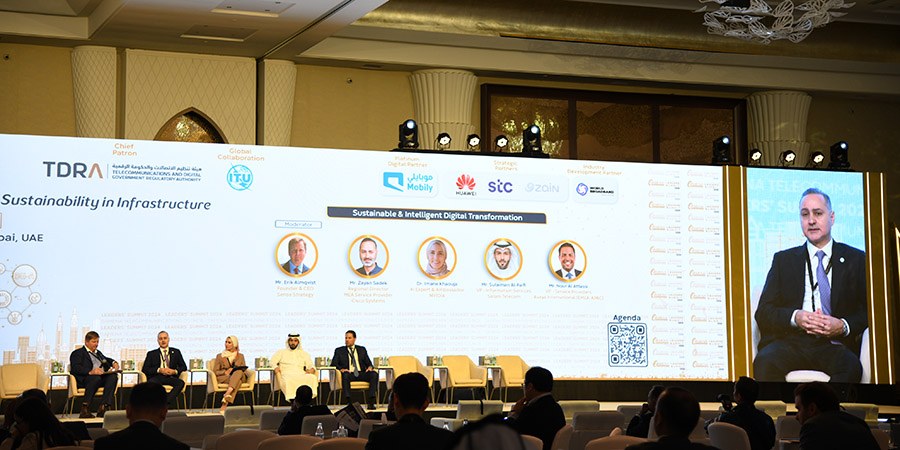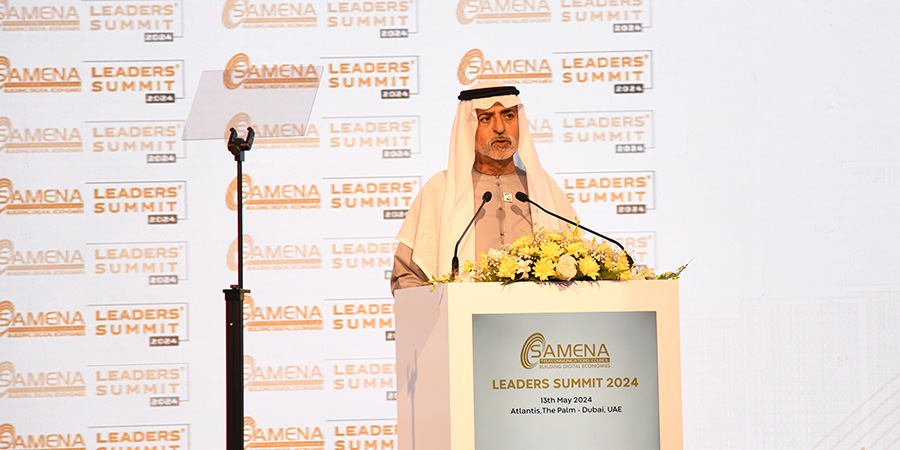Telecom Review Group was invited to attend the SAMENA Leader’s Summit 2024, which explored the theme “Evolving Toward Integration, Intelligence, and Sustainability in Infrastructure.” This summit serves as a platform for dialogue among stakeholders from various industries, including prominent technology companies, emerging leaders in the digital ecosystem, policymakers, and decision-makers in the digital economy.
Telecom's Role in Advancing Digital Innovation
During the opening plenary, the organizer and key leaders shared their insights regarding the ICT industry’s current state, problems, and solutions. In a nutshell, industry leaders emphasized the importance of integration, sustainability, and collaboration in advancing digital transformation, recognizing the pivotal role of telecommunications in driving technological innovation and economic growth, and highlighting the need for inclusive digital infrastructure to foster connectivity and innovation across various sectors.
H.E. Sheikh Nahyan bin Mabarak Al Nahyan, UAE’s Cabinet Member and Minister of Tolerance and Coexistence, stressed the “need for a digital infrastructure” to support innovation and collaboration across researchers, innovators, entrepreneurs, civil organizations, and government, aiming to position the region at the forefront of technological development.
Moreover, Bocar Ba, CEO and Board Member SAMENA Council emphasized the correlation between integration, sustainability, and industry evolution. He advocates for a holistic focus on technology, infrastructure, cyber resilience, and digital innovation to unite stakeholders.
Notably, Eng. Olayan Alwetaid, Chairman, SAMENA Council Board and Group CEO of stc Saudi Arabia, underscored stc's commitment to advanced, resilient digital advancements. He further emphasized the importance of fostering collaborative dialogues and contributing to the national vision for digital transformation.
H.E. Mohammed Al Ramsi, Deputy Director General at Telecommunications and Digital Government Regulatory Authority (TDRA) and the WRC-23 Chairman noted the crucial link between telecom quality and digital innovation, advocating for collaborative efforts to drive interconnected digital life and advance new services across verticals.
Additionally, James Chen, President of Huawei Carrier Business in China said that 2024 is a “key year for the development of the ICT industry.” ICT has become a general-purpose technology, and with robust investment in connectivity and infrastructure, sustainable, economic growth can be achieved. He underscored the 5G and 5G-Advanced efforts within the region that are currently being recognized worldwide.
In alignment with the ICT industry’s progress and collaborative regulations, H.E. Dr. Cosmas Zavazava, ITU Director of the Telecommunication Development Bureau at ITU advocates for no one to be left behind in technological advancements, emphasizing the need for collective efforts to achieve digital inclusion.
Sustainable and Intelligent Digital Transformation

Zayan Sadek, Regional Director, MEA Service Provider, Cisco Systems, participated as a panelist in a thought-provoking discussion covering topics such as cloud computing, artificial intelligence, ICT talent, and sustainable development.
While discussing top-line business and service opportunities, Sadek delved into the staggering growth projected for IoT devices by 2025, emphasizing the need for innovative approaches to managing and monetizing the vast amounts of data they generate.
Transitioning to the subject of sustainability and environmental responsibility, the discussion shifted towards the concept of a circular economy. Sadek underscored the importance of integrating circular design principles into product manufacturing processes, aiming for 100% adoption in their products by 2025. Cisco’s commitment in line with this extends beyond product design to include service delivery models and business practices, with a focus on waste reduction, recycling, and responsible consumption. “This is not the only way forward; it has to be an ongoing service,” he continued. “It has to be matching our business models and financial forecasts and weigh on the way we deliver and sell our services and programs.”
“I believe that service providers are in a unique position to drive the transformation in their own infrastructure, as well as be an enabler and a catalyst for private and public sector,” said Sadek. This can be seen in how service providers, such as Cisco, transform their business structure with the latest technologies to achieve higher productivity with lower energy consumption.
The Cisco representative also highlighted the collaboration between various domains within service provider architectures. This entails optimizing resources, especially in the optical domain, to minimize space requirements, energy consumption, and maintenance demands. He further emphasized the importance of efficiency in resource utilization for sustainable operations, stating that, “We are at the edge of leveraging and making use of the power of data and making the right intelligent decision on the network to match the demand and supply in the usage and achieve more efficiency in the network consumption.”
Another key item mentioned by Sadek was the importance of nurturing an innovation culture within the company, with a particular focus on “how we can really push everyone in the company with innovation.” This aligns with the importance of constantly seeking new solutions to tackle sustainability challenges.
Sadek also discussed Cisco's current return policy, available to every customer. It mandates recycling or disposal, aligning with a comprehensive assurance plan. Additionally, Cisco is refining its manufacturing processes, utilizing equipment from the market pullback to enhance sustainability across its portfolio. This strategy, coupled with flexible data and technology consumption, aims to deepen customer commitment and effectiveness.











